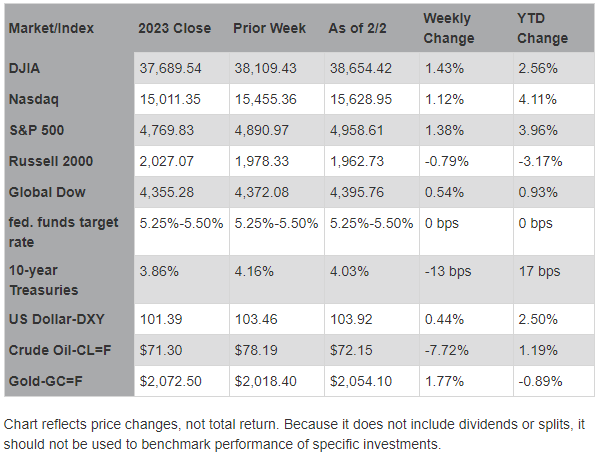Market Week: February 5, 2024
Presented by William Prentice, AWMA®, CFP®, CIMA®
KEY DATES/DATA RELEASES
2/5: S&P Services PMI
2/7: International trade in goods and services
THE MARKETS (as of market close February 2, 2024)
A strong labor report and solid earnings data from megatech companies helped drive stocks higher last week. Each of the benchmark indexes listed here posted solid gains with the exception of the Russell 2000. Nine of the 11 market sectors advanced last week, led by consumer discretionary, consumer staples, and health care, while real estate and energy declined. Ten-year Treasury yields trended lower for most of the week, only to vault higher on Friday. Crude oil prices, which had been surging, fell last week as continued unrest in the Middle East has irritated oil markets. The dollar inched higher, while gold prices advanced.
The S&P 500 (0.8%) and the Dow (0.6%) reached new record highs to kick off the week ahead of several key earnings reports. The tech-heavy Nasdaq gained 1.1% to reach a 52-week high. The Russell 2000 gained 1.6% and the Global Dow rose 0.5% as investors were bullish on stocks as they awaited fourth-quarter earnings data from more than 100 S&P 500 companies released later in the week. Ten-year Treasury yields fell 6.9 basis points to 4.09%. Crude oil prices stepped back following last week's surge, falling nearly 1.3% to $77.00 per barrel. Gold prices advanced 0.7%, while the dollar was flat.
The Nasdaq lost 0.8% last Tuesday ahead of earnings reports from some major tech companies. The small caps of the Russell 2000 also slipped 0.8%, while the S&P 500 dipped 0.1%. The Dow rose 0.4% and the Global Dow ticked up 0.1%. Ten-year Treasury yields declined for the second straight day, losing 3.2 basis points to settle at 4.05%. Crude oil prices reversed course, closing at about $77.88 per barrel after gaining 1.4%. The dollar fell 0.2%, while gold prices continued their mini bull run after advancing 0.5%.
Last Wednesday saw Wall Street react negatively to the Federal Reserve's indication that interest rates will not be coming down any time soon. Each of the benchmark indexes declined, with the Russell 2000 (-2.3%) and the Nasdaq (-2.2%) falling the furthest, followed by the S&P 500 (-1.6%), the Dow (-0.8%), and the Global Dow (-0.4%). Bond prices increased, pulling yields lower, with 10-year Treasury yields falling 9.2 basis points to 3.96%. Crude oil prices dropped 2.6%, settling at $75.78 per barrel. The dollar rose 0.2%, while gold prices ticked up 0.1%.
Stocks rebounded last Thursday, with each of the benchmark indexes listed here closing higher. Investors were not deterred by Federal Reserve Chair Jerome Powell's indication that interest rates would not likely be lowered in March, when the Fed next meets. Several major corporations posted solid fourth-quarter earnings data, which also helped support equities. The Russell 2000 advanced 1.4% to lead the benchmark indexes listed here, followed by the Dow (1.0%), the Nasdaq and the S&P 500 (0.3%), and the Global Dow (0.2%). Ten-year Treasury yields fell to 3.86%, a decrease of 10.4 basis points. Crude oil prices dropped 2.5% to $73.92 per barrel as traders focused on attempts to broker a cease-fire between Israel and Hamas. The dollar slid 0.2%, while gold prices rose 0.2%.
Equities closed higher last Friday with the exception of small caps which lagged. By the close of trading, the Dow (0.4%) and the S&P 500 (1.1%) reached new record highs. The Nasdaq jumped 1.7%, bolstered by strong earnings results from megatech companies. The Global Dow inched up 0.2%, while the Russell 2000 declined 0.6%. As investors moved to stocks, demand for bonds fell, sending yields higher. Ten-year Treasury yields climbed 17.0 basis points to 4.03%. Crude oil prices continued to slide, falling 2.3%. The dollar gained 0.8%, while gold prices lost 0.8%.
This week is light on economic data. Most of the attention will remain on the escalating conflict in the Middle East and the presidential primaries. The January survey of purchasing managers in the services sector is out this week. December saw the Purchasing Managers' Index expand modestly.
Data sources: Economic: Based on data from U.S. Bureau of Labor Statistics (unemployment, inflation); U.S. Department of Commerce (GDP, corporate profits, retail sales, housing); S&P/Case-Shiller 20-City Composite Index (home prices); Institute for Supply Management (manufacturing/services). Performance: Based on data reported in WSJ Market Data Center (indexes); U.S. Treasury (Treasury yields); U.S. Energy Information Administration/Bloomberg.com Market Data (oil spot price, WTI, Cushing, OK); www.goldprice.org (spot gold/silver); Oanda/FX Street (currency exchange rates).
News items are based on reports from multiple commonly available international news sources (i.e., wire services) and are independently verified when necessary with secondary sources such as government agencies, corporate press releases, or trade organizations. All information is based on sources deemed reliable, but no warranty or guarantee is made as to its accuracy or completeness. Neither the information nor any opinion expressed herein constitutes a solicitation for the purchase or sale of any securities, and should not be relied on as financial advice. Forecasts are based on current conditions, subject to change, and may not come to pass. U.S. Treasury securities are guaranteed by the federal government as to the timely payment of principal and interest. The principal value of Treasury securities and other bonds fluctuates with market conditions. Bonds are subject to inflation, interest-rate, and credit risks. As interest rates rise, bond prices typically fall. A bond sold or redeemed prior to maturity may be subject to loss. Past performance is no guarantee of future results. All investing involves risk, including the potential loss of principal, and there can be no guarantee that any investing strategy will be successful.
The Dow Jones Industrial Average (DJIA) is a price-weighted index composed of 30 widely traded blue-chip U.S. common stocks. The S&P 500 is a market-cap weighted index composed of the common stocks of 500 largest, publicly traded companies in leading industries of the U.S. economy. The NASDAQ Composite Index is a market-value weighted index of all common stocks listed on the NASDAQ stock exchange. The Russell 2000 is a market-cap weighted index composed of 2,000 U.S. small-cap common stocks. The Global Dow is an equally weighted index of 150 widely traded blue-chip common stocks worldwide. The U.S. Dollar Index is a geometrically weighted index of the value of the U.S. dollar relative to six foreign currencies. Market indexes listed are unmanaged and are not available for direct investment.
Prepared by Broadridge Advisor Solutions. © 2023 Broadridge Financial Services, Inc.


